First Impressions Community Exchange Program “great reminder of what matters”
 As a new holiday season approaches, most of us know how hard it is to take time off from our commitments and busy schedules to do something new. But recent research by organizational psychologists and neurologists finds that having new experiences – new sounds, sights, or smells – changes our perspective, sparks creativity and even builds new neural pathways in our brains. A new program called the First Impressions Community Exchange aims to bring these benefits to communities across the state by providing a “fresh set of eyes” on community challenges. The program, sponsored by the University of Connecticut-Extension in partnership with the Connecticut Main Street Center, is a structured community assessment designed to help communities learn about their strengths and shortcomings through the eyes of first-time visitors. Participation in the program requires a volunteer commitment and a $200 application fee. Applications are being accepted through December 15, 2016 for communities interested in participating in an exchange in the Spring of 2016.
As a new holiday season approaches, most of us know how hard it is to take time off from our commitments and busy schedules to do something new. But recent research by organizational psychologists and neurologists finds that having new experiences – new sounds, sights, or smells – changes our perspective, sparks creativity and even builds new neural pathways in our brains. A new program called the First Impressions Community Exchange aims to bring these benefits to communities across the state by providing a “fresh set of eyes” on community challenges. The program, sponsored by the University of Connecticut-Extension in partnership with the Connecticut Main Street Center, is a structured community assessment designed to help communities learn about their strengths and shortcomings through the eyes of first-time visitors. Participation in the program requires a volunteer commitment and a $200 application fee. Applications are being accepted through December 15, 2016 for communities interested in participating in an exchange in the Spring of 2016.
How It Works
Once communities are accepted they are matched with a similar community or neighborhood in terms of size, location, amenities or natural features. Both communities agree to recruit volunteer teams of 4-8 people, participate in training, conduct unannounced visits and report on their findings within a timeline of 3-4 months. Participants become “secret shoppers” for the day and follow procedures to document their visit using a guidebook and uploading photos and comments. The guidebook ensures that evaluations and reports are thorough and uniform and requires minimal training. Reports from the program are often used as part of broader community assessment or planning processes to inform community policy and action.
Hundreds of communities across the U.S. and Canada have implemented the First Impressions Program since it was developed by the University of Wisconsin, Cooperative Extension in the early 1990s. The program was introduced in Connecticut in 2015 and four communities – Canton, Putnam, Windsor Locks and Portland – have participated in pilot exchanges. As a result of the program, communities often gain a new perspective on their own assets, learn about small changes that can make a big difference, or replicate development projects that other communities have used successfully. According to one Connecticut team member it was “…a great reminder of what matters; of the opportunity for enhancing what we have. I’m reminded that one town shouldn’t try to be like another in all cases. Each town has its unique assets.”
Communities interested in participating can learn more and download the short application form at http://communities.extension.uconn.edu/firstimpressions/. For more information contact Laura Brown UConn Extension, laura.brown@uconn.edu, 203-207-0063 or Susan Westa, CT Main Street Center, susan@ctmainstreet.org, 860-280-2032.
###
More information about the first Impressions Program including community reports, can be found at http://communities.extension.uconn.edu/firstimpressions/
About UConn Extension
Over 100 UConn Extension specialists work in communities across Connecticut as educators, problem solvers, catalysts, collaborators and stewards. To many Connecticut residents they are the face of UConn. Our eight regional Extension Centers, the Sea Grant program at Avery Point, the 4-H Education Center at Auerfarm, the Home and Garden Education Center and the UConn Extension office in Storrs all collaborate to fulfill our land grant university’s third mission of outreach and public engagement.
UConn Extension’s off campus classrooms include: high-tech greenhouses, coastal estuaries, elementary school gardens, community centers for high risk teens and municipal town halls. We use an interdisciplinary approach and take knowledge directly to the public. UConn Extension enhances small businesses, the economic and physical well-being of families and offers opportunities to improve the decision-making capacity of community leaders.
About Connecticut Main Street Center
CMSC’s mission is to be the catalyst that ignites Connecticut’s Main Streets as the cornerstone of thriving communities. CMSC is dedicated to community and economic development within the context of historic preservation, and is committed to bringing Connecticut’s commercial districts back to life socially and economically.
CMSC is supported by its Founding Sponsors, the CT Department of Economic & Community Development (DECD) and Eversource Energy. CMSC is also supported by its Growth Sponsors, UIL Holdings Corp. and the State Historic Preservation Office. More information is available at www.ctmainstreet.org.
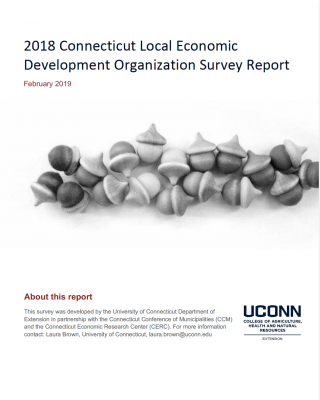
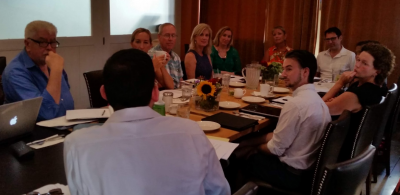
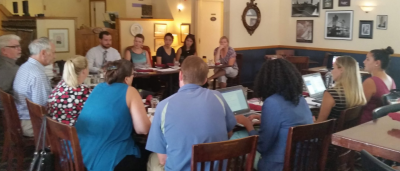
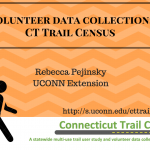 Becky Pejinsky interned with UConn Extension programs in Community & Economic Development in Fall 2015. As a result of her work with the Connecticut Trail Census project, she produced
Becky Pejinsky interned with UConn Extension programs in Community & Economic Development in Fall 2015. As a result of her work with the Connecticut Trail Census project, she produced 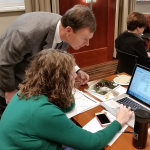 As a partnership between the Connecticut Main Street Center, UConn Extension and the University of Wisconsin Extension six communities and several state agencies attended a workshop on December 2, 2016 to learn how to conduct a downtown market analysis. Nationally known downtown expert and Community Business Development Specialist Bill Ryan and UConn Extension Educator Laura Brown co-presented the morning agenda which included an overview of ways to use existing data to better understand downtown trade areas and market potential. John Simone, from the CT Main Street Center led a discussion in the afternoon about what data might be needed to benchmark success and demonstrate how downtowns are changing statewide. Based on an evaluation of the 14 participants many felt the most effective part of the workshop was learning about new online tools like the Downtown Market Analysis Toolbox, Canva & On The Map. If you weren’t there, you can explore the tools presented in the workshop here:
As a partnership between the Connecticut Main Street Center, UConn Extension and the University of Wisconsin Extension six communities and several state agencies attended a workshop on December 2, 2016 to learn how to conduct a downtown market analysis. Nationally known downtown expert and Community Business Development Specialist Bill Ryan and UConn Extension Educator Laura Brown co-presented the morning agenda which included an overview of ways to use existing data to better understand downtown trade areas and market potential. John Simone, from the CT Main Street Center led a discussion in the afternoon about what data might be needed to benchmark success and demonstrate how downtowns are changing statewide. Based on an evaluation of the 14 participants many felt the most effective part of the workshop was learning about new online tools like the Downtown Market Analysis Toolbox, Canva & On The Map. If you weren’t there, you can explore the tools presented in the workshop here: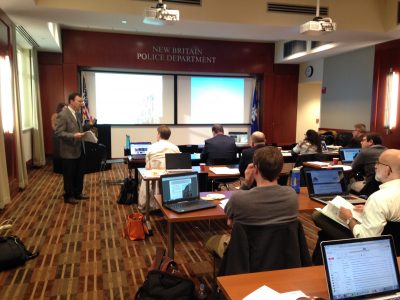
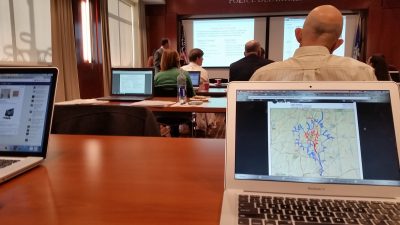

 As a new holiday season approaches, most of us know how hard it is to take time off from our commitments and busy schedules to do something new. But recent research by organizational psychologists and neurologists finds that having new experiences – new sounds, sights, or smells – changes our perspective, sparks creativity and even builds new neural pathways in our brains. A new program called the First Impressions Community Exchange aims to bring these benefits to communities across the state by providing a “fresh set of eyes” on community challenges. The program, sponsored by the University of Connecticut-Extension in partnership with the Connecticut Main Street Center, is a structured community assessment designed to help communities learn about their strengths and shortcomings through the eyes of first-time visitors. Participation in the program requires a volunteer commitment and a $200 application fee. Applications are being accepted through December 15, 2016 for communities interested in participating in an exchange in the Spring of 2016.
As a new holiday season approaches, most of us know how hard it is to take time off from our commitments and busy schedules to do something new. But recent research by organizational psychologists and neurologists finds that having new experiences – new sounds, sights, or smells – changes our perspective, sparks creativity and even builds new neural pathways in our brains. A new program called the First Impressions Community Exchange aims to bring these benefits to communities across the state by providing a “fresh set of eyes” on community challenges. The program, sponsored by the University of Connecticut-Extension in partnership with the Connecticut Main Street Center, is a structured community assessment designed to help communities learn about their strengths and shortcomings through the eyes of first-time visitors. Participation in the program requires a volunteer commitment and a $200 application fee. Applications are being accepted through December 15, 2016 for communities interested in participating in an exchange in the Spring of 2016.